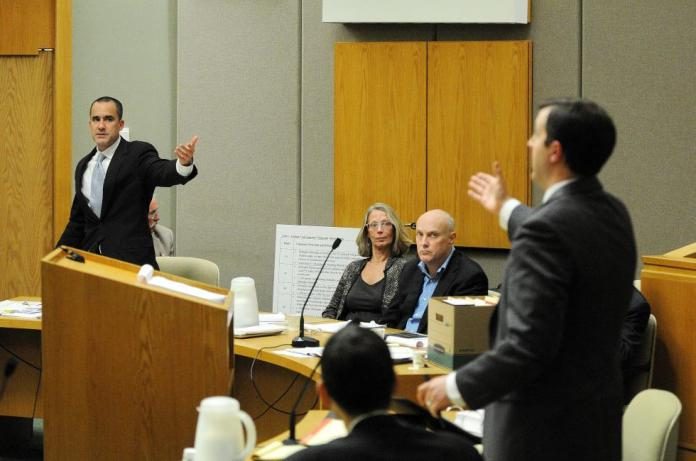This summary is written by Nandini Biswas, a student from NMIMS School of Law, Bengaluru.
Introduction of the host- Mr. Ramanuj Mukherjee
He started online businesses in the legal domain like iPleaders.in, LawSikho.com and Superlawyer.in and has been building them up over the last decade.
iPleaders blog was started way back in 2009, from his college and since then it has become one of the largest legal blogs in the world that cover legal issues relevant to common people.
He also started lawsikho.com which is the leading online legal learning platform, offering courses with live online classes, lots of exercises, mentorship and hands on training to hundreds of lawyers, law students and executives every month.
He is currently the CEO of LawSikho.
Introduction of the guest- Mr. Ajar Rab
Mr. Ajar Rab is currently working as a partner in Rab and Rab Associates LLP. Both of his parents are lawyers. Rab and Rab Associates LLP is a family run partnership firm by Ajar, his brother and his sister in law. The firm was established in 2010. He is also a visiting professor at NLSIU and an adjunct visiting professor at NUJS.
He completed his BA LLB course from National Law School of India University (NLSIU), Bangalore. After which he pursued Masters in Intl. Arbitration, Intl. Litigation, Mergers and Acquisition, EU laws and Corporate Restructuring from Bucerius Law School.
He was an associate with Amarchand Mangaldas, member of the drafting committee for ‘Legal Reforms in Criminal Procedure Code’, Law Commission of India, member of the drafting committee for, ‘Legal Reforms for Selection and Recruitment of Civil Servants’, Karnataka State Public Service Commission, State of Karnataka and a member of drafting committee for ‘The Mysore and Karnataka Universities (Special Provisions) Act’. He also worked as a Research and Editorial Assistant for ‘March of Consumer Law and Practice’, Ministry of Consumer Affairs, Food and Public Distribution, Department of Consumer Affairs.

Summary of the Webinar- How to make a career in litigation in a small city
- What has been your journey in Rab and Rab Associates LLP?
It wasn’t easy. We had to struggle a lot to convince people that we deliver results. Clients doubted since we were a start-up and we are a family run firm. There were strong teething challenges. Law firm is a new concept for people in Dehradun. We tried to create a market that does not exist. For this, law firms in Delhi and Mumbai helped us setting up our firm by sending cases. Till now, we have represented big clients like Rakesh Roshan, production house of the movie Article 15, Facebook, Birla tiers, etc. It came gradually and with a fair amount of struggle. Setting up a law firm in a small city has its own challenges. People assume that you are not a good lawyer. The traditional mindset of people says that bigger the city- better the professionalism.
- Why are there very few law firms in tier 2 tier 3 cities in spite a large contribution in GDP and a lot of investment?
People do not want to come back in these cities once they go out for education or internship or for jobs. They want people to have the bandwidth to take up large transactions. Moreover, it does not sound very lucrative enough to say that, I work in a law firm in Dehradun. People also doubt on the survival of the firm as clients do not have faith on small city law firms. People want to be in Delhi and Bombay as glamour is attached to working in a big city. Another reason is that, from the very first day of their law firm, people want to become as big as Amarchand Mangaldas, they miss on the point that became a brand after several years of them being in the industry.
- What are the opportunities one can find in tier 2 and tier 3 cities?
There is a lot of legal work in small cities since there are a very few firms offering local legal support. Big cities have got saturated with business, thus the companies are expanding their business in small cities. Small cities are like stocks waiting for investments, they will grow sooner or later. There is a lot of scope for legal work as there is a big dearth of competition in tier 2 and tier 3 cities.
- Are law firms in different cities connected which each other? Do they work together?
Since there are very few law firms in small cities and people have to move to big cities for legal advice, there have been times when these big firms from tier 1 cities have referred my firm as a local support to the client. In the filing process, a lot of groundwork is involved for which you have to travel to different cities. Therefore, what law firms in tier 1 cities do is, they tie-up with local law firms as their local counsel for them to do the ground work.
Similarly, if small law firms in small cities do not specialize in the field if work that their clients are looking for, they refer their clients to some of the big city law firms.
It is a two-way relationship.
- Have you been able to do work sitting in Dehradun on a pan-India basis?
Most of my arbitration practices are overseas. Technology and trans-national jurisdiction helps in working on a pan-India basis. I provide legal consultancy to a firm in Israel. I feel that, it does not matter where you are as long as you are able to provide legal service and add value to the work the client gives you.
- How will you describe the demand and supply mismatch that is happening in these tier 2 tier 3 cities? Why are lawyers failing to capture this opportunity?
There is an asymmetry of information. People in small cities think only about civil and criminal litigation. They fail to see the growing opportunities in areas like IPR, tax laws etc. Lawyers in small cities can take opportunity of this demand and supply mismatch and practice in such non-traditional law areas.
- Is it true that clients generally prefer counsels who are old and experienced when it comes to litigation?
It can be true to a large extent, but not completely. At first, every client will prefer to hire senior counsels but if you are able to show your potential and convince the client that even you can do what the senior counsel is doing, then, they will be more than ready to hire you since it will cost them less. I will share one personal experience- A client brought some senior lawyers from Allahabad to Dehradun and I was the local filing counsel of the client. While chitchatting with him in the absence of the senior counsels, the client told me the case and I gave my viewpoints on it. After 2 days, he called me and told that I do not need the senior counsels if you are willing to take up my case.
Basically, you need to create value to the work.
- How to grow big in the field of practice?
I will like to quote from Julius Ceaser- It is better to be first in a village rather being 2nd in Rome.
In big tier cities, you are competing with already establish law firms who have been practicing since a very long time. It does not make sense to compete with them.
What you can do is, you can gain experience from the big law firms by working or interning there, and then set up your own law firm in tier 2 or tier 3 cities.
You also need to find the hidden opportunity in the demand supply mismatch.
You should also be aware of the political outfall of the all the actions that a client can possibly engage in so that you can advise them on that aspect too. You have to understand the local dynamics.
You should constantly update yourself and should be aware about the happenings. For eg.- If a client asked you about something and you tell that I will check and get back to you, you have lost the client. If you are updated with the information he wants, and you give them a brief, the client will get impressed. What will be the political outfall of your actions?
You can start of as an independent practitioner and then expand and set up the law firm.
- In small cities, do you need to specialize in everything in order to make a bigger mark?
No, not really. If you do that, you will jack of all but master of none. In the beginning, you can specialize in one thing and have a small amount of practice in the rest.
It is important to make your own niche practice that makes you stand different from the rest.
- How to make your own niche practice?
You have to be visible in the circle where you want to make your niche practice.
Suppose you want to specialize in banking laws, you have to create a circle or be in the circle which includes bankers, and company employees dealing with the banking or finance sections of the company.
Once, you are in that kind of a circle, make yourself noticed in the circles by talking about the kind of work you wish to do.
- What was your business development strategy?
I did not have any strategy. One thing I followed is, I did not say no to any kind of work. I had a passion for teaching and I used to teach, that gave me a lot of clients. People whom I taught used to refer me to the clients.
You should also read the Economic times. This will tell you what kind of industries can invest in your district.
Host’s suggestion- download the industrial report of the district in which you are practicing and then reach out to people and educate them on the legal side of their business. The report will contain a list of industries in the district.
- How to build your own team in a small city, since a lot of people want to work in top tier law firms?
I had interns and employees who used to say that they did not learn drafting when they were with the top tier law firms. So, I taught them drafting and gave them that work. Give them work that top tier law firms cannot. Most importantly, trust their work and develop a personal relation with them so that they are willing to stay with you.
- Will the aftermath of COVID-19 give more opportunities to tier 1 law firms?
I feel that the small law firms will be benefited since people would refrain from travelling, so they will visit their local law firms instead of going to different city/state.
- I want to set up a law firm in Kanpur, how should I go about it?
There are various ways that you can adopt in the beginning like:
- Make yourself visible.
- Conduct talk shows.
- Give free legal advices in the beginning.
- Try to be in the kind circle from where you can receive work.
- Deliver value to your first client.
- You should be well equipped and well updated.
- Sustain the professionalism.
- Focus on retaining the clients, since it is easy to get clients but difficult to retain them.
- Build a human relationship.
- Spend time working on unidentified problems of the companies, talk to them about it, research on it, and give them solutions.
- Give them a workable solution, not what every law firms offer.
- Identify the demand of the market and provide them with solutions.
As long as you keep getting the desired result to your clients, they will believe in you and your work and will refer other to you.
LawSikho has created a telegram group for exchanging legal knowledge, referrals and various opportunities. You can click on this link and join:
 Serato DJ Crack 2025Serato DJ PRO Crack
Serato DJ Crack 2025Serato DJ PRO Crack










 Allow notifications
Allow notifications


